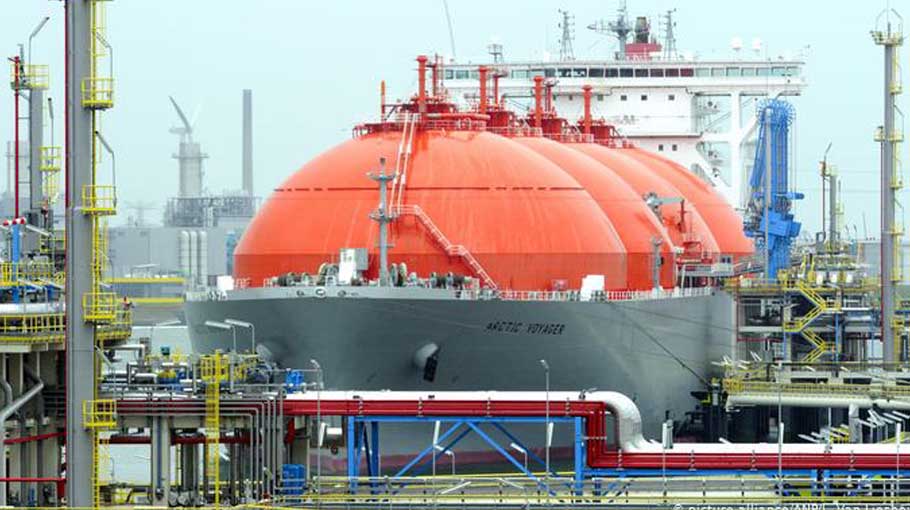LNG price alarmingly high in world market
Industrial production being hampered, power generation cost rises

As the price of gas has sharply increased in the global market, the country’s gas crisis is increasing again creating various crises sauch as disruption in industrial production and increase of the cost of electricity generation.
Besides, CNG filling stations, fertilizer factories and household consumers are also facing a gas crisis.
According to the concerned sources, the import of LNG (Liquified Natural Gas) has been declining due to its price hike in the world market for several months.
Along with this, the production of domestic gas has also decreased. On the other hand, new gas fields are being discovered less due to the slow pace of exploration, affecting the gas supply in the country.
Energy Division officials said efforts were being made to address the crisis by importing LNG from the spot market. At the same time, the government has decided to close CNG stations for four hours every day to increase gas supply to power plants.
According to Petrobangla, the import of LNG from the spot market has been stopped due to the increase of prices in the international market. Daily LNG supply to the national gas grid has declined by about 100 million cubic feet in the last two weeks.
Currently, the daily demand of gas in the country is 430 crore cubic feet, whereas Petrobangla is supplying around 300 crore cubic feet of gas. When LNG was imported in 2018, the daily gas supply of the country was 275 crore cubic feet against the daily demand of 360 crore cubic feet.
Although the deficit has come down a lot since the start of LNG imports, it has now increased. The main reason for this is the lack of supply from domestic sources. Even seven-eight years ago, the daily gas production in the country was 270 crore cubic feet, but now it has come down to 240-245 crore cubic feet.
In this situation, there is a huge possibility of getting gas in the sea, but the exploration work has not started yet.
Ministry of Power, Energy and Mineral officials said around 250 industrial applications had been received for new gas connections, but they could not be connected now due to insufficient supply.
Some industrialists in Dhaka, Gazipur, Narayanganj and Chattogram said the gas crisis has been increasing since last March. Although it decreased slightly in May and June, it has increased since late July. At certain times of the day the prescribed pressure of gas in their line drops to one-third. Then production has to be stopped. At that time, those industries could not generate electricity even from their own captive power plants. As a result, industrial production, export activities and the economy are being harmed, affecting the export orders of the garment sector.
Many foreign orders are being canceled due to failure to complete production on time.
BGMEA Director Asif Ibrahim told the Bangladesh Post that due to ongoing gas crisis, factories are to run by diesel, which is too costly. Currently, per unit electricity generation cost from captive power is less than Tk. 4. Those who do not have captive generation system are buying electricity from the government at Tk 7.68 per unit. On the other hand, the cost of diesel is about Tk 21 per unit.
‘In this situation, production and delivery of goods is not going according to the demand of the buyer. We have suffered a lot because of Covid-19 pandemic. Now if gas supply is not normal then industrialization will be hampered. The government must take immediate steps in this regard. If necessary, uninterrupted supply of gas to the industry should be ensured even with subsidy,’ he continued.
Asif Ibrahim also suggested that gas should be given to the industry by stopping the use of it in private cars. This will increase the production of the factory. The economy will prosper. Besides, the government may take other steps, he added.
In just two months, Bangladesh had to buy LNG at double the price. The gas is now being bought from Accelerate Energy at $13 per cubic meter, which was $6 in October last year. In June, Tk 448.16 crore was spent to buy 33 lakh 60 thousand MMBTU LNG from Accelerate.
The same amount of gas was bought from the spot market through AOT trading in Switzerland last April at a cost of Tk 243.30 crore. So Petrobangla has spent more than Tk 205 crore in two months.
LNG worth around Tk 20,000 crore has been purchased in the last financial year. In the 2018-19 financial year, a subsidy of Tk 1,000 crore was given for importing LNG. In 2019-20, the subsidy increased by Tk 2.5 crore. In the last financial year (2020-21), Petrobangla had to pay a subsidy of Tk 2,812 crore for LNG imports. This amount will increase further this year.
Anisur Rahman, senior secretary of the energy division told Bangladesh Post ‘it was decided not to buy LNG from the spot market due to rising prices. The crisis is happening because the supply is less than the demand. However, now we have taken initiatives to import LNG from the spot market. Hope a LNG ship will reach Bangladesh this month and two more cargo will be received next month. We expect that the gas crisis will go away a lot.’
‘Government has taken extensive initiatives to explore gas onshore and offshore to solve the gas crisis in the long run. There are also plans to work the old wells and extract gas from the hypertension zone. Besides, more floating and land based LNG terminals would be set up. As a result, the crisis will be reduced in the coming years,’ he said.
According to BGMEA, "Many dyeing factories have stopped production due to lack of gas. It is about to stop the sewing of the garment factory. The factories now have a lot of orders. Now is the time to actually turn around in the Covid-19 crisis. It is possible to export an additional $400-500 crore.
An industrialist said the boiler has to be run with diesel as there is no gas in the line. It takes 700 liters of diesel per hour to run a 10 tonne boiler. This huge amount of diesel is difficult to manage and is expensive.
On the other hand, the electricity generation cost is increasing due to the gas crisis. In a meeting on August 25, Petrobangla informed PDB that the supply of 200 million cubic feet of gas in electricity will be reduced. It is possible to generate 1200 MW of electricity with this gas.
The average cost of generating electricity per unit of gas is at Tk 0.26, whereas per unit generation cost for Furnace Oil is at Tk 13 to 14. And the cost of diesel is Tk 18 to 26. If the generation cost increases, the subsidy on electricity will also increase. In the fiscal year 2020-21, Tk 11,700 crore has to be subsidized for electricity.
At present, the country's gas fields are producing 240 crore cubic feet of gas per day. According to a recent report by the Energy Division, daily gas production could fall to 230 crore cubic feet this year. If no big gas field is discovered, gas production from the country's fields could be reduced by 18.4 crore cubic feet per day in 2022-23. In 2023-24, the daily production may decrease by 43.5 crore cubic feet. As an alternative, the government has taken steps to increase LNG imports. The government estimates that the demand for 200 to 250 crore cubic feet of gas per day will be met by importing LNG in the 2024-25 fiscal year.




